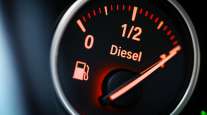Diesel Slips to $3.955; Gas at Record
By Sean McNally, Senior Reporter
This story appears in the April 14 print edition of Transport Topics.
U.S. diesel prices remained at historically high levels last week, even though the official retail average dropped 0.9 cent to $3.955 a gallon, leading several trucking executives to express concern over the future of independent drivers and small fleets, and others to push for government action.
At the same time, the average price of regular gasoline rose 4.2 cents to a new record of $3.332 a gallon, the Department of Energy reported after its April 7 survey of fueling stations. In addition, the price of crude oil set another record on the New York Mercantile Exchange, hitting $112.21 a barrel during intraday trading on April 9. It closed at $110.87.
“The industry is going to go through a purging,” said Gary Salisbury, chief operating officer of Fikes Truck Line Inc., Hope, Ark. “The guys that are borderline are not going to make it. The fuel is taking a toll and people are . . . [not going] to make it through this time.”
“Freight’s picking back up, but the serious situation I see right now is the survival of the independent contractor,” said Jim O’Neal, president of O & S Trucking Inc., Springfield, Mo., citing the higher cost of fuel.
O’Neal said he’d prefer the average were published more often. He said price fluctuations after the weekly number is posted have “taken hundreds of dollars per week out of the wages that independent contractors earn” because carriers aren’t able to adjust their fuel surcharges fast enough.
Tom Kloza, chief analyst with the Oil Price Information Service, said the numbers from DOE’s Energy Information Administration, are “unfortunately kind of a rearview-mirror look” at prices.
In an April 7 interview with Transport Topics, Kloza said wholesale prices for diesel already had gone “up another eight to 10 cents,” a harbinger of higher retail prices — and potentially new price records — to come.
Though the national diesel average has fallen 3.4 cents over the past two weeks from a peak of $3.989, it is still $1.115 a gallon higher than the corresponding week of last year.
Trucking burns an estimated 730 million gallons of diesel and 290 million gallons of gasoline each week.
The gasoline average, which set its second straight record, is 53 cents a gallon higher than it was a year ago.
The consistently high cost of fuel has fleets worried about their owner-operators and trying to help them manage the higher costs.
Salisbury said flatbed carrier Fikes, which uses owner-operators exclusively, has been working on an incentive program for its drivers to better manage their fuel and “give them a reason to upgrade their equipment, to get better fuel mileage, to burn less fuel, to get APUs [auxiliary power units] on their units.”
“The big battle for us right now is keeping our owner-operators happy, keeping them profitable and getting them past this fuel crisis before maybe things will settle down and they can make the money that they need to,” Salisbury said.
The high cost of fuel has raised eyebrows in Congress, where a group of Arkansas congressmen are calling for an investigation.
Democrats Mike Ross, Vic Snyder and Marion Berry and Republican John Boozman, who represent all four of the state’s congressional districts, have asked House leaders for an “investigation into the explanations and causes of excessive prices of diesel fuel.”
They said the “spike in prices has taken a dramatic toll on net disposable incomes for working families across this country . . . [and] placed tremendous economic pressure on the trucking, freight, agriculture and business community.”
That pressure has O’Neal predicting more troubles ahead.
“We’re pretty adaptable; we can live with higher fuel prices, if the volatility is taken out of it. But the bigger problem with high fuel prices is the chilling effect on the overall economy,” O’Neal said. “If our fuel surcharges add a significant amount to the cost of a loaf of bread and just the everyday necessities, then that has a chilling effect on the economy.”
DOE said it expected the prices of diesel to remain high throughout the year.
“Diesel prices are projected to show even larger increases in 2008, averaging $3.62 per gallon, or 74 cents above the 2007 average price,” the April 8 report said.
However, DOE did say it expected diesel prices to “peak at just over $3.90 per gallon in April.”
This story appears in the April 14 print edition of Transport Topics.
U.S. diesel prices remained at historically high levels last week, even though the official retail average dropped 0.9 cent to $3.955 a gallon, leading several trucking executives to express concern over the future of independent drivers and small fleets, and others to push for government action.
At the same time, the average price of regular gasoline rose 4.2 cents to a new record of $3.332 a gallon, the Department of Energy reported after its April 7 survey of fueling stations. In addition, the price of crude oil set another record on the New York Mercantile Exchange, hitting $112.21 a barrel during intraday trading on April 9. It closed at $110.87.
“The industry is going to go through a purging,” said Gary Salisbury, chief operating officer of Fikes Truck Line Inc., Hope, Ark. “The guys that are borderline are not going to make it. The fuel is taking a toll and people are . . . [not going] to make it through this time.”
“Freight’s picking back up, but the serious situation I see right now is the survival of the independent contractor,” said Jim O’Neal, president of O & S Trucking Inc., Springfield, Mo., citing the higher cost of fuel.
O’Neal said he’d prefer the average were published more often. He said price fluctuations after the weekly number is posted have “taken hundreds of dollars per week out of the wages that independent contractors earn” because carriers aren’t able to adjust their fuel surcharges fast enough.
Tom Kloza, chief analyst with the Oil Price Information Service, said the numbers from DOE’s Energy Information Administration, are “unfortunately kind of a rearview-mirror look” at prices.
In an April 7 interview with Transport Topics, Kloza said wholesale prices for diesel already had gone “up another eight to 10 cents,” a harbinger of higher retail prices — and potentially new price records — to come.
Though the national diesel average has fallen 3.4 cents over the past two weeks from a peak of $3.989, it is still $1.115 a gallon higher than the corresponding week of last year.
Trucking burns an estimated 730 million gallons of diesel and 290 million gallons of gasoline each week.
The gasoline average, which set its second straight record, is 53 cents a gallon higher than it was a year ago.
The consistently high cost of fuel has fleets worried about their owner-operators and trying to help them manage the higher costs.
Salisbury said flatbed carrier Fikes, which uses owner-operators exclusively, has been working on an incentive program for its drivers to better manage their fuel and “give them a reason to upgrade their equipment, to get better fuel mileage, to burn less fuel, to get APUs [auxiliary power units] on their units.”
“The big battle for us right now is keeping our owner-operators happy, keeping them profitable and getting them past this fuel crisis before maybe things will settle down and they can make the money that they need to,” Salisbury said.
The high cost of fuel has raised eyebrows in Congress, where a group of Arkansas congressmen are calling for an investigation.
Democrats Mike Ross, Vic Snyder and Marion Berry and Republican John Boozman, who represent all four of the state’s congressional districts, have asked House leaders for an “investigation into the explanations and causes of excessive prices of diesel fuel.”
They said the “spike in prices has taken a dramatic toll on net disposable incomes for working families across this country . . . [and] placed tremendous economic pressure on the trucking, freight, agriculture and business community.”
That pressure has O’Neal predicting more troubles ahead.
“We’re pretty adaptable; we can live with higher fuel prices, if the volatility is taken out of it. But the bigger problem with high fuel prices is the chilling effect on the overall economy,” O’Neal said. “If our fuel surcharges add a significant amount to the cost of a loaf of bread and just the everyday necessities, then that has a chilling effect on the economy.”
DOE said it expected the prices of diesel to remain high throughout the year.
“Diesel prices are projected to show even larger increases in 2008, averaging $3.62 per gallon, or 74 cents above the 2007 average price,” the April 8 report said.
However, DOE did say it expected diesel prices to “peak at just over $3.90 per gallon in April.”




